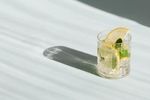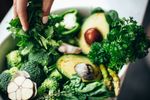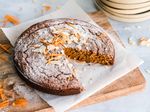
Caitlin Kilgore
Reviewed By

Dr. Frank Lipman
Chief Medical Officer at THE WELL
Published: 10/26/2022
Learn how these food groups affect the body, and tips to form a healthier relationship — without eliminating them completely.
If you find yourself yearning for another cup of coffee to fuel you through the morning, a sugary afternoon pick-me-up or a glass (or two) of wine to de-stress at night, you’re not alone.
While tempting, sugar, alcohol and caffeine are not your faithful friends — at least if you consume them in excess. That doesn’t mean you can’t enjoy them from time to time, but it’s important for your health (both mental and physical) to treat these three food groups as visitors — not permanent residents — of your kitchen cupboards.
By learning how they affect the body and helpful tips to curb consumption, you’ll find that the “big three” can absolutely be part of a healthy lifestyle — in moderation and in tune with what works for your body.
SUGAR
You’ve likely heard it before — sugar has some not-so-sweet effects on your health. But why is sugar bad for you? And how do you stop sugar cravings?
For starters, sugar significantly spikes blood sugar levels, which creates a negative ripple effect throughout the body on mood regulation, cognitive function, energy levels, hormones and weight management, according to certified Health Coach Raj Barker. It can even weaken the immune system.
Sugar is also highly addictive. “It stimulates the pleasure and reward centers of the brain which can make us feel a short lived sense of pleasure, but is often followed by the ‘sugar blues,’ taking our moods on a rollercoaster ride of peaks and valleys,” says Katrine van Wyk, certified Health Coach. Sugar can even disrupt your gut microbiome and trigger hunger signals.
Sugar not only affects your health on a physiological level, but also emotionally: Symptoms of anxiety, stress and even depression can be worsened by sugar intake, says van Wyk.
RELATED: What to Eat When You Have Anxiety
Tips for Taming Your Sweet Tooth
Though it may take some willpower, cutting out sugar (or at least limiting it) isn’t impossible. To get started, take the following advice from Barker and van Wyk:
1. Up Your Healthy Fats and Proteins
Increase healthy fats (think: avocado, olive oil and nuts) in your diet to support sugar cravings. “Ensure your meals include healthy protein, fats and unrefined carbs to provide your body with the necessary nutrients it needs to flourish,” notes Barker. “When we become depleted in key nutrients, we can often crave sugar.”
2. Get Your Gut In Check
The bacteria (the bad kind) in your gut may be contributing to your sugar cravings. To help manage any unhealthy overgrowth in the gut or small intestine, consider working with a health coach or functional medicine doctor, advises Barker.
3. Try A Reset
Because sugar and refined carbohydrates (like white flour) are addicting, the more you eat, the more you crave. “Consider doing a reset where you don’t eat any sugar for a few weeks to break the addiction and habits around snacks and sugar,” says van Wyk.
4. Read Nutrition Labels
Navigating nutrition labels can help clue you in to where sugar hides. Usually, it’s in a lot of processed, packaged foods, but it can also be in takeout meals, salad dressings and even salsa or tomato sauce. Get into the habit of reading labels on the foods you usually buy or keep stocked in your pantry, suggests van Wyk. “The ingredients on the label are listed in order starting with the most-used,” she explains. “If sugar (in any form) is within the first few ingredients on the label you can safely assume it’s a high-sugar food.”
And remember: one teaspoon of sugar is the same as four grams of sugar. So if your favorite kombucha contains 12g of sugar, that’s the same as 3 teaspoons of sugar, notes van Wyk.
RELATED: How to Decode Nutrition Labels
5. Find Your Dose of Sweetness Elsewhere
If you have a hankering for something sweet, this could be an indication that you’re craving more sweetness in your life, metaphorically speaking. “Do more of the things that make you feel good, fill you up and bring you joy — including human connection and touch,” says van Wyk.
CAFFEINE
While there is much to enjoy about the morning ritual of a piping hot cup of coffee or tea, it doesn’t take much to overdo your daily dose of caffeine. In fact, “anything over two standard servings (12 ounces) and you double your inflammatory markers,” says Barker.
“Caffeine causes the release of stress hormones cortisol and adrenaline, so for someone who is already dealing with a lot of stress or who is run down from chronic stress, the caffeine can add to the load of already overworked adrenal glands,” says van Wyk. High levels of stress hormones can impact anxiety, insomnia, immunity and over time, it can lead to adrenal exhaustion.
Plus, coffee is an addictive stimulant so it can be difficult to break the habit. “It’s good to take breaks from time to time to reset, check in with what’s your actual energy levels (when not stimulated by caffeine) and get back to a place where you feel the desired benefit from one cup of coffee, and not needing three (or more) cups a day just to get by,” advises van Wyk.
On the upside, coffee does have good antioxidants and can be a healthy diuretic — just make sure it’s organic! Coffee plants are among the most pesticide sprayed plants. “For some, it can make a big difference switching to a coffee that is organic, pesticide free and tested for mycotoxins (formed by molds growing on coffee plants) such as BulletProof and Kion,” says van Wyk.
Because each of us metabolize caffeine differently, it’s also important to find a timeline for when to consume caffeine that works for you. “Caffeine tends to have a 6 hour life in our bodies but many find that it affects their sleep quality even with a longer time period between their last cup and bedtime than just six hours,” says van Wyk.
Tips for Cutting Back on Caffeine
1. Consider Timing
“In many cultures coffee is used almost as a digestive support post-meals (think an espresso shot after lunch in Italy). So consider not only how, but when you drink your coffee to get the most benefits and the least amount of stress or harm,” says van Wyk who advises to avoid drinking it black and on an empty stomach due to its high acidity.
2. Explore Alternatives
Sometimes we crave the idea of coffee more than the actual cup. If you find yourself in the mood for a warming beverage or pick-me-up, explore healthier alternatives to coffee — like chai tea, dandelion tea, matcha or other herbal teas.
3. Go Easy on Yourself
Understand that if you have consumed excess coffee long term, you may experience withdrawal symptoms like headaches as you cut back. Go gently on these initial days and remind yourself that you’re cutting back for the sake of your health, says Barker.
4. Add a Healthy Fat
“You can slow down caffeine absorption to experience a slower, more steady flow of energy by adding fat to your coffee, either in the form of cream, butter or MCT oil,” says van Wyk, adding that collagen peptides (amino acids) also help slow caffeine release.
ALCOHOL
A glass of red wine here and there can certainly be a part of a healthy lifestyle, but knowing how alcohol affects the body allows you to be more mindful about how and when you consume it.
Research shows that alcohol increases inflammation particularly in the gut, damaging the GI tract and other organs (like the liver). And for women, there’s a strong link between alcohol consumption and breast cancer risk.
Besides being highly inflammatory, alcohol often contains a lot of sugar and can have the same impact on the body that sugar does, spiking blood sugar levels. Because most people consume alcohol in the evening, that sugar spike can play out in the early morning hours, disrupting your sleep cycle, says Barker. Plus, after consuming alcohol, “many experience an increase in anxiety or depressive feelings the following day,” adds van Wyk.
RELATED: 6 Ways to Make Dry January Way Easier

Tips for Curbing Alcohol:
1. Include Dry Days in your Week
One way to curb your consumption is by “commiting to a number of consecutive dry days each week where you avoid alcohol altogether,” says Barker. Structuring your week like this can help you build a framework for when you want to indulge and to do it mindfully.
2. Make A Mocktail Instead
Sometimes you can’t ignore the desire to sip on something tasty at the end of the day. And there’s something to be said about the art of making a cocktail — it can be a creative and delicious compliment to a homemade meal.
Need some inspiration? Check out this story: 3 Tasty Mocktail Recipes (You Won't Miss the Alcohol, Promise!).
3. Schedule Other Activities
A lot of times social events revolve around alcohol, but they don’t have to! Van Wyk suggests scheduling dates and social events that don’t revolve around alcohol like a hike in nature, a fun sports activity or a trip to the spa.
4. Support Your Body When You Do Drink
When you do decide to enjoy an alcoholic beverage, make sure to hydrate well and boost your liver with supplements (like NAC) and B vitamins to avoid feeling sluggish and depleted, advises van Wyk.



